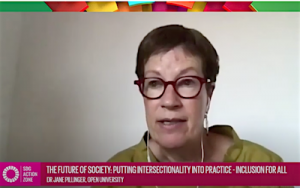You are here
- Home
- Businesses set to play greater role in curbing domestic violence, leading expert tells UN General Assembly
Businesses set to play greater role in curbing domestic violence, leading expert tells UN General Assembly
28 October 2020

Businesses will play an increasingly proactive role in curbing gender-based violence and supporting victims of domestic violence, according to Open University researcher Dr Jane Pillinger.
Dr Pillinger, a world renowned expert on issues of tackling violence and harrassment in the workplace,was speaking at the 75thsession of the UN General Assembly which took place 22-24 September.
She was taking part in an expert panel discussion on how business can support inclusion and address ‘intersectionality’ – that is, the way that some individuals are disadvantaged by multiple inequalities.
Women who face discrimination on multiple grounds – for example black, disabled or migrant women – are more likely to experience violence and harassment, and companies’ policies need to take account of this, she said.
Campaigns like #MeToo, Black Lives Matter and Time’s Up, and the impact of COVID-19, have moved issues of sexual harassment, discrimination and domestic violence higher up the agenda.
Key campaigner
A ‘real breakthrough’ has been the adoption of the new International Labour Organisation (ILO) Convention on Violence and Harassment at work, she said.
Dr Pillinger has been a key mover in the successful six-year campaign to adopt the Convention, which promotes a gender-based, intersectional approach, and includes measures to protect employees suffering from domestic violence.
It incorporates research she carried out with the ILO and UN Women, which also forms the basis for the ILO/UN Women’s Handbook: Addressing violence and harassment against women in the world of work, published shortly before the Convention was adopted in June 2019.
She has also produced a ‘call to action for the private sector’ on domestic violence, and has been working with a number of global multinational companies to develop policies.
Last year one of these, Vodafone, became the first company to offer up to 10 days of paid leave to employees worldwide affected by domestic abuse.
The adoption of the Convention was supported by employers and the labour movement, as well as the women’s movement, who have all helped to bring it into being.
Singled out here is the International Trade Union Confederation’s global campaign ‘Stop gender-based violence’, and their current campaign with global and national unions for ratification #RatifyC190.
Keeping women safe at work
It has already been ratified by two countries and many others, including the UK, are expected to follow suit once they have implemented the necessary legislation, she said.
“The Convention is groundbreaking because it not only promotes a gender-based approach to preventing and addressing violence and harassment for all workers, formal or informal, but for the first time it also takes into account the impact of domestic violence on workers.
“Once ratified, it makes it an obligation in law for companies to introduce provisions to support women who suffer from domestic violence where it impacts on their work; to make sure that these women are safe from assault and stalking in the workplace, and help keep them in employment by offering constructive support like flexible working and paid leave.
“It’s the first international treaty to give people the right to work in conditions free from violence and harassment, and every company, every organisation will need a robust policy and risk assessment to cover these issues.”
Watch the full UN panel discussion here.
The UN's 16 Days of Activism against Gender-Based Violence begins on International Day for the Elimination of Violence against Women on 25 November.
Dr Jane Pillinger is a Visiting Research Fellow in the department of Social Policy and Criminology at The Open University. She is co-author with Professor Nicola Yeates of International Health Worker Migration and Recruitment: Global Governance, Politics and Policy, the first comprehensive study of its kind.
Share this page:
Monthly Archive
- March 2024 (1)
- November 2023 (1)
- February 2023 (1)
- January 2023 (1)
- November 2022 (1)
- October 2022 (1)
Contact us
To find out more about our work, or to discuss a potential project, please contact:
International Development Research Office
Faculty of Arts and Social Sciences
The Open University
Walton Hall
Milton Keynes
MK7 6AA
United Kingdom
T: +44 (0)1908 858502
E: international-development-research@open.ac.uk
.jpg)